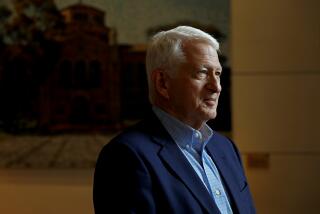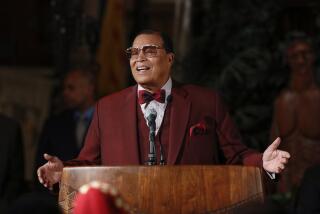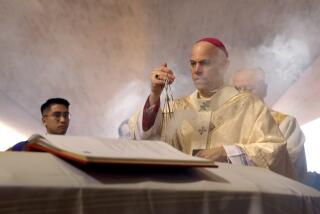Farrakhan’s Message of ‘Hate and Bigotry’ Is ‘Evil’--Deukmejian
- Share via
Gov. George Deukmejian, using the national convention of the Episcopal Church as a forum, denounced anti-Semitism on Wednesday and singled out Black Muslim leader Louis Farrakhan, who is scheduled to speak in Los Angeles on Saturday, as a “messenger of hate and bigotry.”
“In the past,” Deukmejian said, Farrakhan “has praised Adolf Hitler, preached anti-Semitism, condemned and threatened some of our nation’s black leaders and slandered the very country that protects his right to speak.”
Farrakhan “is a divisive demagogue whose message is evil and very dangerous,” Deukmejian, an active Episcopalian, told the 1,100 delegates meeting at the Anaheim Convention Center for their triennial general convention. “He cloaks himself in the robes of religion.”
The governor made his strong denunciation while prominent black leaders in Los Angeles--including Mayor Tom Bradley--have withheld public criticism of Farrakhan.
Vehement Protests
The planned appearance of the controversial head of the Nation of Islam, who has called Judaism “a gutter religion,” has provoked vehement protests from Southern California Jewish leaders and stirred ferment in the general community.
Some Jewish leaders have also been critical of Bradley for not speaking out.
“This is the first failure of courage Bradley has demonstrated in the more than 30 years I have known him,” said Harvey B. Schechter, regional director of the Anti-Defamation League of B’nai B’rith. “The man who is the No. 1 citizen of Los Angeles, who should have organized and led the opposition . . . to this bigot . . . refused to do so.”
Ali Webb, Bradley’s spokeswoman, said Wednesday: “We have no response to Mr. Schechter’s statement. We’re continuing to work on the problem. Meetings continue to happen.”
Bradley’s office has said he will make no statement on Farrakhan’s scheduled appearance until Saturday, when he plans to hold a news conference.
Farrakhan is scheduled to speak at the Forum in Inglewood on Saturday night about POWER (People Organized and Working for Economic Rebirth), a movement he started last January with a $5-million loan from Libyan leader Moammar Kadafi to enhance black economic opportunities.
Anti-Semitic Remarks
Farrakhan gained national prominence last year during Jesse Jackson’s presidential campaign. He appeared at several Jackson rallies to support the black politician. Although Jackson disavowed Farrakhan’s blatant anti-Semitic remarks, he was reluctant to dissociate himself from the Chicago-based Muslim leader because he carries strong influence in the black community.
Rabbi Alfred Wolf, spiritual leader of Los Angeles’ Wilshire Boulevard Temple, said local Jewish leaders had asked Bradley to make a specific statement about Farrakhan.
Saying that Deukmejian’s criticism of Farrakhan “reflects very much my own view of . . . (Farrakhan’s) mentality and danger,” Wolf said in an interview that he considers Farrakhan “a far greater danger to the welfare of the black community than to the Jewish community. . . . Black separatism is more dangerous to blacks here than apartheid is (to blacks) in South Africa.”
Schechter said the mayor’s planned press conference will be “too little too late,” adding, “By Saturday, the horses are out of the barn.”
Deukmejian, a member of All Saints’ Episcopal Church in Long Beach, spoke first to the convention’s assembly of the 950-member House of Deputies, which is composed of equal numbers of Episcopal clergy and lay delegates, then gave the same message to the 209-member House of Bishops. He received polite but restrained applause at each session.
Deukmejian said Farrakhan has the right to “come to California and speak his mind. But I deplore his message of hate and I know that this feeling is shared by nearly all the residents of our state.”
The governor also denounced “hate-filled fringe groups,” citing the Ku Klux Klan and the American Nazi Party, and said further U.S. government sanctions against South Africa, because of that nation’s policy of apartheid, may be necessary.
‘Basic Human Rights’
Deukmejian drew applause in both houses of the Episcopal delegation when he said:
“We, the freest and most fortunate people in the world, cannot sit idly by while the black people of South Africa are denied the most basic human rights and liberties.”
The Episcopal Church has historically been a bridge between Roman Catholicism and Protestantism and has had influence far beyond its numbers in the United States--only slightly more than 1% of the population.
Studies have found that one-fifth of the heads of major corporations are Episcopalians, as are 20% of the U.S. Senate and 12% of the House of Representatives. Vice President George Bush is an Episcopalian, and 11 U.S. presidents have been members of the Episcopal Church.
Times Staff Writer Penelope McMillan contributed to this story.
More to Read
Sign up for Essential California
The most important California stories and recommendations in your inbox every morning.
You may occasionally receive promotional content from the Los Angeles Times.













